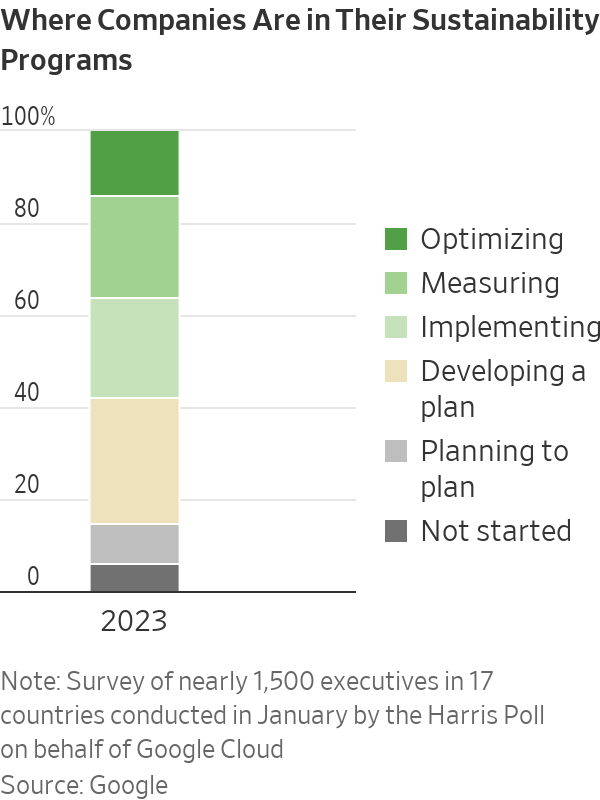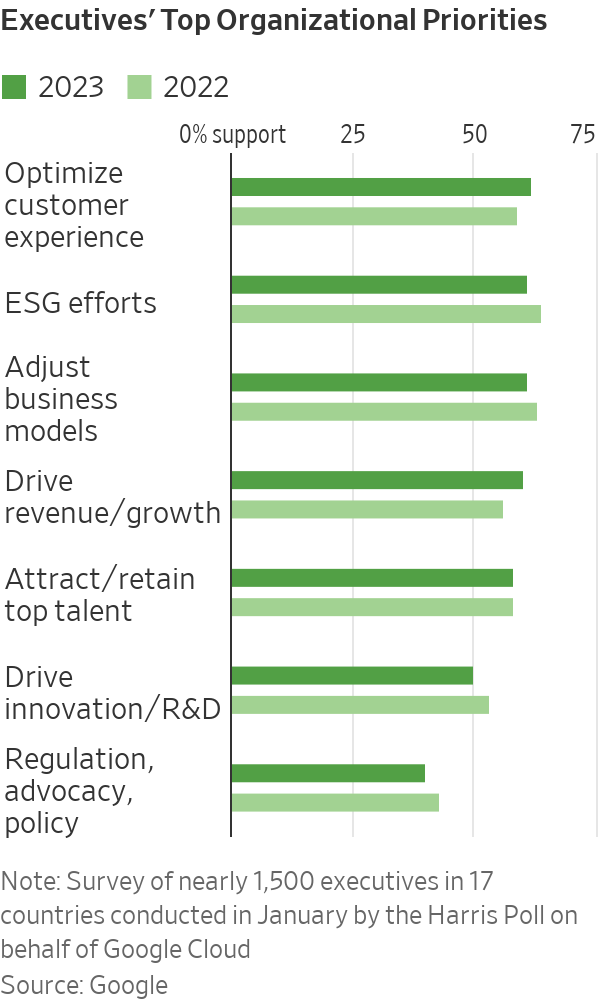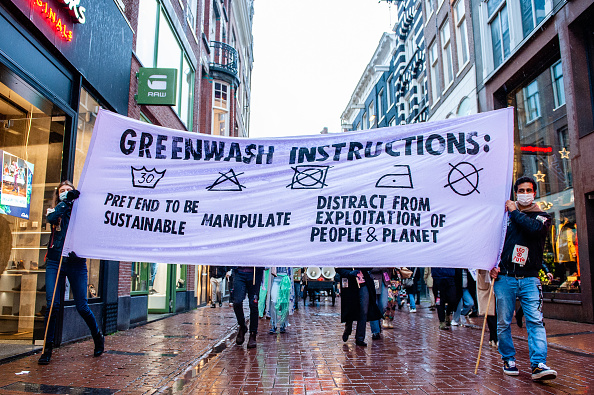Global Executives Say Greenwashing Remains Rife
Nearly three-quarters of corporate leaders say most organisations in their industry would be caught greenwashing if they were investigated thoroughly
Most global executives think greenwashing is widespread in their industry, and despite customers becoming more vocal about preferring sustainable brands, many companies are cutting corners on their environmental, social and corporate governance initiatives.
Nearly three-quarters of executives said most organisations in their industry would be caught greenwashing if they were investigated thoroughly, according to a survey of nearly 1,500 executives across 17 countries and seven industries conducted in January by the Harris Poll on behalf of Google Cloud.
The risk of greenwashing is increasing with crackdowns on overstated green claims on both sides of the Atlantic. Despite that threat, the figures are consistent with last year’s findings: Nearly 60% say their own organisation is overstating its sustainability methods. While for some it may be intentional, most say it is instead often due to setting sustainability goals or pledges without a concrete plan to reach them.
“There are actors that are maybe intentionally overstating what they’re doing, but I honestly think for the most part, companies are sincere—they’ve set their goals, they’re working towards them, but they don’t always have the data to be transparent,” said Kate Brandt, chief sustainability officer at Google.
The survey gives insight into where companies are in their sustainability efforts. A little more than a quarter are developing their sustainability programs, 22% have a plan they are implementing, another 22% are able to measure its impact, and 14% are in the final stage of optimising their plan based on measured outcomes. In contrast, nearly a tenth plan to start developing their sustainability plan in the near future, while the remaining 6% don’t have a plan or any intention to come up with one soon.

Nearly three-quarters of executives said they want to advance sustainability efforts but don’t actually know how to go about doing it. Top tools identified to improve their ability were having a dedicated sustainability leader, support from senior management, advanced measurement tools, and education for employees and executives. And the two main ways they expect advancement is through technology innovation as well as investment in sustainable operations or services.
With nearly a decade of experience as a CSO, Ms. Brandt said the survey findings reinforced her point of view on how a company can set itself up to be successful. Businesses need strong governance powered by good data and metrics and a dedicated sustainability leader to be the center of gravity but one who can also embed sustainability inside business functions.

Most executives surveyed—85%—said customers and clients are becoming more vocal about their preference for engaging with sustainable brands. However, economic uncertainty means that business leaders have increased their focus on customers, revenue and growth, although ESG issues remain one of businesses’ top three priorities.
While an earlier survey by industrial conglomerate Honeywell International Inc. found that sustainability budgets at most companies were relatively insulated from cuts, the more recent Google Cloud survey indicates things may have changed. Two-thirds of executives in the latest survey said they are having to cut corners on sustainability initiatives and 45% said the economy is negatively affecting their organisations’ sustainability efforts.
“Essentially when times are getting hard, you get to see who’s serious about this agenda and those who are paying lip service or perhaps accidentally overstating their efforts,” said Justin Keeble, managing director of global sustainability at Google Cloud.
 Copyright 2020, Dow Jones & Company, Inc. All Rights Reserved Worldwide. LEARN MORE
Copyright 2020, Dow Jones & Company, Inc. All Rights Reserved Worldwide. LEARN MORE
Chris Dixon, a partner who led the charge, says he has a ‘very long-term horizon’
Americans now think they need at least $1.25 million for retirement, a 20% increase from a year ago, according to a survey by Northwestern Mutual
Whether you call it charisma, charm or magnetism, some people seem like naturals. Good news: It can be learned.
Great leaders have it. Gen Z has a new word for it. Can the rest of us learn it?
Charisma—or rizz , as current teenage slang has anointed it—can feel like an ephemeral gift some are just born with. The chosen among us network and chitchat, exuding warmth as they effortlessly hold court. Then there’s everyone else, agonising over exclamation points in email drafts and internally replaying that joke they made in the meeting, wondering if it hit.
“Well, this is awkward,” Mike Rizzo, the head of a community for marketing operations professionals, says of rizz being crowned 2023 word of the year by the publisher of the Oxford English Dictionary. It’s so close to his last name, but so far from how he sees himself. He sometimes gets sweaty palms before hosting webinars.
Who could blame us for obsessing over charisma, or lack thereof? It can lubricate social interactions, win us friends, and score promotions . It’s also possible to cultivate, assures Charles Duhigg, the author of a book about people he dubs super communicators.
At its heart, charisma isn’t about some grand performance. It’s a state we elicit in other people, Duhigg says. It’s about fostering connection and making our conversation partners feel they’re the charming—or interesting or funny—ones.
The key is to ask deeper, though not prying, questions that invite meaningful and revealing responses, Duhigg says. And match the other person’s vibes. Maybe they want to talk about emotions, the joy they felt watching their kid graduate from high school last weekend. Or maybe they’re just after straight-up logistics and want you to quickly tell them exactly how the team is going to turn around that presentation by tomorrow.
You might be hired into a company for your skill set, Duhigg says, but your ability to communicate and earn people’s trust propels you up the ladder: “That is leadership.”
Approachable and relatable
In reporting this column, I was surprised to hear many executives and professionals I find breezily confident and pleasantly chatty confess it wasn’t something that came naturally. They had to work on it.
Dave MacLennan , who served as chief executive of agricultural giant Cargill for nearly a decade, started by leaning into a nickname: DMac, first bestowed upon him in a C-suite meeting where half the executives were named Dave.
He liked the informality of it. The further he ascended up the corporate hierarchy, the more he strove to be approachable and relatable.
Employees “need a reason to follow you,” he says. “One of the reasons they’re going to follow you is that they feel they know you.”
He makes a point to remember the details and dates of people’s lives, such as colleagues’ birthdays. After making his acquaintance, in a meeting years ago at The Wall Street Journal’s offices, I was shocked to receive an email from his address months later. Subject line: You , a heading so compelling I still recall it. He went on to say he remembered I was due with my first child any day now and just wanted to say good luck.
“So many people say, ‘Oh, I don’t have a good memory for that,’ ” he says. Prioritise remembering, making notes on your phone if you need, he says.
Now a board member and an executive coach, MacLennan sent hundreds of handwritten notes during his tenure. He’d reach out to midlevel managers who’d just gotten a promotion, or engineers who showed him around meat-processing plants. He’d pen words of thanks or congratulations. And he’d address the envelopes himself.
“Your handwriting is a very personal thing about you,” he says. “Think about it. Twenty seconds. It makes such an impact.”
Everyone’s important
Doling out your charm selectively will backfire, says Carla Harris , a Morgan Stanley executive. She chats up the woman cleaning the office, the receptionist at her doctor’s, the guy waiting alongside her for the elevator.
“Don’t be confused,” she tells young bankers. Executive assistants are often the most powerful people in the building, and you never know how someone can help—or hurt—you down the line.
Harris once spent a year mentoring a junior worker in another department, not expecting anything in return. One day, Harris randomly mentioned she faced an uphill battle in meeting with a new client. Oh!, the 24-year-old said. Turns out, the client was her friend. She made the call right there, setting up Harris for a work win.
In the office, stop staring at your phone, Harris advises, and notice the people around you. Ask for their names. Push yourself to start a conversation with three random people every day.
Charisma for introverts
You can’t will yourself to be a bubbly extrovert, but you can find your own brand of charisma, says Vanessa Van Edwards, a communications trainer and author of a book about charismatic communication.
For introverted clients, she recommends using nonverbal cues. A slow triple nod shows people you’re listening. Placing your hands in the steeple position, together and facing up, denotes that you’re calm and present.
Try coming up with one question you’re known for. Not a canned, hokey ice-breaker, but something casual and simple that reflects your actual interests. One of her clients, a bookish executive struggling with uncomfortable, halting starts to his meetings, began kicking things off by asking “Reading anything good?”
Embracing your stumbles
Charisma starts with confidence. It’s not that captivating people don’t occasionally mispronounce a word or spill their coffee, says Henna Pryor, who wrote a book about embracing awkwardness at work. They just have a faster comeback rate than the rest of us. They call out the stumble instead of trying to hide it, make a small joke, and move on.
Being perfectly polished all the time is not only exhausting, it’s impossible. We know this, which is why appearing flawless can come off as fake. We like people who seem human, Pryor says.
Our most admired colleagues are often the ones who are good at their jobs and can laugh at themselves too, who occasionally trip or flub just like us.
“It creates this little moment of warmth,” she says, “that we actually find almost like a relief.”
Chris Dixon, a partner who led the charge, says he has a ‘very long-term horizon’
Americans now think they need at least $1.25 million for retirement, a 20% increase from a year ago, according to a survey by Northwestern Mutual






















